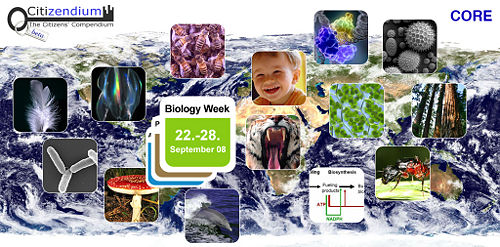CZ:Biology Workgroup/Biology Week: Difference between revisions
imported>Supten Sarbadhikari |
imported>Supten Sarbadhikari |
||
| Line 45: | Line 45: | ||
{{rpl|Model species}} | {{rpl|Model species}} | ||
{{rpl|Breast cancer}} | {{rpl|Breast cancer}} | ||
{{rpl|Glycolysis}} | |||
== Biology articles started during Biology Week == | == Biology articles started during Biology Week == | ||
Revision as of 05:15, 22 September 2008
For planning and administration of Biology Week, go here.
Welcome to Biology Week!
We are planning a big "online convention" of Biologists here on the Citizendium. Would you like to see more work done on articles about ![]() Biology on Citizendium? Then here is your chance to make a difference.
Biology on Citizendium? Then here is your chance to make a difference.
Background information for newcomers
How do I register to participate in Biology Week
- Request a Citizendium account
- Register as a Biology Author.
- If you qualify for expertise in an area of biology, please also register as a Biology Editor.
- It takes only a few minutes at most to fill out the form
- Within hours, 24 at most, you will receive login information
In case of problems with registration, please contact the constables (who handle technical matters here at Citizendium) via an email to constables@citizendium.org.
What exactly can you contribute to Biology Week?
In principle, you have two ways to contribute
- by improving existing articles listed as biological, especially the Core and High Priority articles or
- by starting new articles fitting in there.
Lecturers and other instructors have a third option - assigning Citizendium articles as coursework via our Eduzendium initiative.
How to improve existing biology articles?
You can improve
- the content, phrasing, structure or illustration of an article
- the content phrasing or structure of an article's subpages (e.g. Related Articles, Bibliography, External Links, Gallery, Video, or Definitions).
If an article has already been approved, improvements (subject to re-approval) are still encouraged; for the editable version of the article, click on the "draft" tab, which you can see for example at the top of Life.
How to start new biology articles at Citizendium?
- If you are new to Citizendium, please take a look here and start writing. During Biology Week, many people familiar with formatting will be around to help you.
- If you are new to Biology, you can invite biologists to help you. To this end, please announce your article in the appropriate section below.
In case of any queries or problems contact
Biology Week Coordinators: Supten Sarbadhikari and Daniel Mietchen
Biology articles edited during Biology Week
Please use the format {{rpl|Your Article's name}}. Example:
 Biology: The science of life — of complex, self-organizing, information-processing systems living in the past, present or future. [e]
Biology: The science of life — of complex, self-organizing, information-processing systems living in the past, present or future. [e]- Model species: Species often used in research as models for the study of biological processes. [e]
 Breast cancer: Cancer of the glandular breast tissue. [e]
Breast cancer: Cancer of the glandular breast tissue. [e] Glycolysis: A biochemical pathway by which a molecule of glucose is oxidized to two molecules of pyruvate. [e]
Glycolysis: A biochemical pathway by which a molecule of glucose is oxidized to two molecules of pyruvate. [e]
Biology articles started during Biology Week
Please use the format {{rpl|Your Article's name}}.
- Model species: Species often used in research as models for the study of biological processes. [e]
 Cell division: The process by which a parent cell divides into two or more daughter cells. [e]
Cell division: The process by which a parent cell divides into two or more daughter cells. [e]
Tools
See also Category:Technical_Help
- To wikify scientific references (via Google Scholar). Sample search for "biology next mathematics".
- To find related articles (in Pubmed). Sample search (based on the first paragraph of Life). The site is slow, though, and thus perhaps only of good use if you are looking for references outside your primary field of expertise.
- To find Open Access biomedical images. Sample search for "amygdala"
- Top 10 Ways to Search Wikipedia - much of this is useful here, too
- Biological definitions at the Biology-Online dictionary
- Universal reference formatter
- Zotero (bibliographic management)
- Webcitation.org - a tool that archives webpages so that they can be cited in the form they had when visited

